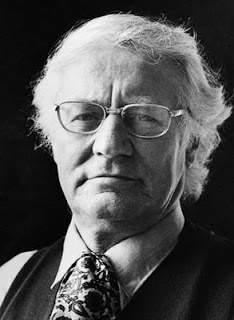Part 5
Robert Bly
The man-boy not only knows all the lyrics of classic Rock and Roll songs, but the names of the musicians, the dates of most songs and the cultural milieu. It’s a walk through American history. How that is possible, I don’t know. This musical terrain is only vaguely familiar to me; was only ever vaguely familiar to me when I was his age. Snatches of lyrics, the steady stream of groups’ names—Kiss, Boston, Def Leppard, Mettalica, Megadeth—at which point I changed the proverbial channel for the next two decades. It was a stream that went underground and then re-surfaced when Joe’s mother came to live with us in 1991 and she had a CD by a group called Nirvana.
It is a terrain which has been documented, for better and for worse, in Cleveland at the Rock and Roll Hall of Fame and Museum. Having the excellent catalogue in my acculturated head that I do, I am reminded of this and mention it to get points with the boy.
“Maybe we should stop in. See what it’s like.”
“Awesome!” he says. Since I’m riding shot gun at the moment, I return to the atlas, madly calculating the triangle route from I-80 northwest and back while subtracting the hypotenuse.
I, the 49-year old, too-young-to-be-a-grandfather –to-a-seventeen-year-old can win points in a way that no one else can. My above-it-all perspective from flight attending resulted in a kind of guerilla-styled touring across the nation during two decades, and it yields this: we can make the man-boy exceedingly happy as we barrel down I-80 to home by first announcing that the hall of fame of his dreams is within a short detour of where we we’re going and that I am game enough to make it happen. That’s what I do. It’s what we used to call “gumption”: I’m the one who makes it happen.
“Awesome!”
The light is fading, exquisite shadings on the vast PA hardwoods. We will not make it to Ohio this evening, so we start looking for a place to stay. This is the beauty of America. Drive anywhere and virtually within the time it takes to start needing to take a wazz, or feel the next pang in three squares a day, and there’s a truck stop, a convenience store and–if you’re lucky–a bona fide mom-and-pop diner. Emlenton, Pennsylvania is one of these, but better. The Plaza is both a truck stop and a restaurant/diner famous, we are about to learn, in these here parts.
By the time we pass the famous Emlenton Bridge which I get the impression was built first followed by the town itself, it is dark. We pull off onto Clintonville Road then parallel I-80 West, turn left into the Plaza, move around to the south, pull into a parking place and our little Corolla quiets itself. We are far enough from the yellow brick road so that it emits the pensive, Doppler sound that elicits reflection, and for a moment none of us move, the engine ticking, a collective sigh rising in us. None of us is particularly hungry, I realize. It’s just that it’s that time of the day, and if we don’t find sustenance now we’ll be raiding the candy machines at the next Econo Lodge.
While Cheryl and the man-boy head in, I head out, around the edge of the sprawling complex baked in what seems like acres of asphalt where trucks the size of small buildings feel right at home as they turn around in an arc that seems as wide as Arkansas. I need to stretch my legs, get my lungs pumping something other than the stale air of fatigue. Around the back of the place there’s a dumpster, old restaurant fixtures a stack of badly upholstered chairs. The place is bigger than I think, and when I round to the north side the pavement seems to expand through the gas pump lanes and to that idling place that trucks go by default off the interstate. The night is quiet but the darkness at the edges of the massive lot is like a wall, the trees beyond claiming a kind of prerogative for the space we have yet to claim for progress.
One more corner to round and I’m in front of the convenience store, attached to the restaurant, this not-so-clean, well-lighted place that both draws as it repels the weary traveler by its utter predictability: the usual display of cellophane-ed bread-like artifacts that claim to be pastries, the waning end-of-day coffee against the back wall next to the bank of coolers featuring plastic bottles in a riot of thirst-quenching colors. Seven kinds of beef jerky.
I ditch into the men’s room, and a stall worn-down with a recent coat of off-white paint. Public bathrooms, I submit, are where American males first feel the charge of their collective manhood—like what I imagine prisons and maybe military bunkhouses elicit in young recruits. Since Title 9, the public bathroom is one of the few (and continually receding) places where the lure to merge with what makes one hormonally male and the inchoate shame that accompanies that impulse is still obvious. That is why the man-boy and others when they are eight or nine, often won’t go to the urinals, but hide away in the stalls. They sense that in a public lavatory, mankind—and I mean that term “genderly”—enters a liminal space that is charged because it is unstable.
The forlorn men’s movement of the 80s tried to address that. Poor Robert Bly. Both were shot down by women and, most importantly, other men, who operate out of a rarified and now moribund feminism. The men’s room has become a cross between a sports bar and a locker room, strutting and straining. Elimination and critical comparisons made with side-long glances over porcelain. It’s a place that has become feminized in that literal hand-washing is done in the men’s room by men first because other men are there policing and then because of the internalized thing that happens in reality-producing culture of the new century. Real men don’t wash their hands because they’ve held their dick to piss.
I’ll take Camille Paglia any day over Gloria Steinem. I’m not sure if this is news to me, but that I am reminded of it in rural Pennsylvania and with Lysol stinging my noise should be peculiar. Maybe it’s just the exhaustion showing.
In the stall, behind the metal box housing the rolls of toilet paper is scrawled “BJ Tap Foot.” But not being a senator from Idaho, I resist. It’s nice to know that some things have never changed since junior high.
Someone enters the bathroom, and I’m brought out of this reverie. (Don’t knock me. The notoriously constipated father of the Reformation, Martin Luther, is said to have done a lot of thinking about things while sitting on the crapper for hours at a time.) There is stillness in the tiled room which is strange. I peer through a space between stall door and wall. On the opposite, mirrored wall is the man-boy. These days he spends a good time in bathrooms both at home and when we’re out. It’s a rite of passage I suppose, and it buttresses my theory of bathrooms, especially public ones, as an unstable, exploratory space. He is arranging his increasingly long bangs that spill out from under the bill of his baseball hat. The hat is the only thing that now keeps his hair out of his eyes. When his hat is off, in fact, the dented hair falls with some grace across his face which appeals to me. But the hat is part of the ensemble. At least for now, and I watch as he almost tenderly pulls at the strands, pushing them up under the bill and band while his mouth drops open slightly in concentration. Often he ditches the hat entirely, bends over the sink and splashes water into his face and hair. When he comes up for air, dripping everywhere, he is a different boy indeed, the oblong shape of his head in clear outline, the bones of his cheeks higher, it seems, and suddenly shiny.
Actually, Cheryl and I are often annoyed by the time it takes him to go to the bathroom as we wait with menus at hand. Sometimes as long as ten minutes. But here, as I watch him lost in his own world, I recall my own long hours in front of the mirror, locked behind the bathroom door in my parents’ home, my shirt off, my chin tilted so that the light would reveal that new whisker coming in. The necessary longing for myself to emerge through my body.
Suddenly I am a voyeur. And I turn my gaze away. I will wait for him to leave so that he doesn’t know I was here. So that there is no risk of any kind of shame.


The good news is that you'll start hitting some modern service areas once you cross into Ohio, and yes, they have Starbucks.
I think it is great that the man-boy is into classic rock: "The paper holds their folded faces to the floor and everyday the paperboy brings more."
Dave, when you and I were his age, if we went when back 30+ years in music history, we would have hit the Big Band era. Listening to Benny Goodman back then? NFW.
Nice thoughtful homage to roadside plumbing.
Nice to know you're still reading. Thanks for the comments and encouragement.
Yep. The Big Band era never could have been cool for us. So maybe R&R really is a different cultural marker.
Stay tuned…